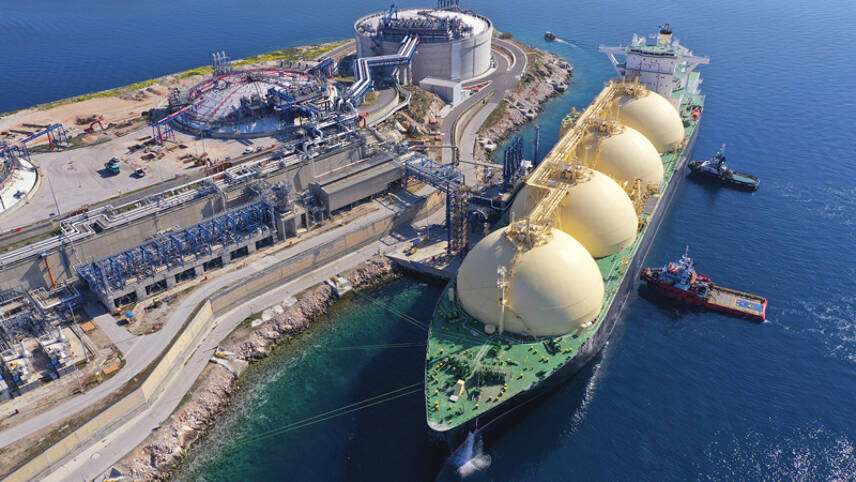Register for free and continue reading
Join our growing army of changemakers and get unlimited access to our premium content

Pictured: An LNG tanker anchored in Salamina, Greece
Published this week by the World Energy Council, the ‘Pulse’ report unveils the results of a survey taken by 533 professionals working in the energy space globally. Respondents hailed from the private, public and charitable sectors, and represented the spectrum of energy types, from fossil fuels, to nuclear, hydrogen, renewables and storage.
According to the report, there is an increasing level of doubt about whether the current gas price crisis, which began brewing last summer and has been exacerbated by Russia’s war in Ukraine, will serve to accelerate the energy transition. 44% of those surveyed said national responses to the crisis will, on the whole, likely slow the pace of the transition. 42% said the responses will accelerate the transition.
This is a marked difference from the Council’s last survey in spring, where 35% of respondents said governments were likely to slow the transition, and 50% said they were likely to speed it up. Respondents in Africa and North America were the most likely that the interventions on offer would slow the transition, while those in the Middle East were most confident in an acceleration.
In Europe, opinion remained slightly skewed towards policy interventions such as the RePowerEU package and the UK’s Energy Security Strategy speeding up the transition. Nonetheless, the report describes a “dramatic shift in policy focus” to a point whereby energy security must trump all other priorities – including the transition to clean energy.
On a global level, the survey found that energy security was the main short-term priority within the so-called energy trilemma for policymakers, closely followed by environmental sustainability. The gap between the two issues was greater in Europe than on the global average.
This is informing where organisations are placing their own focus and resource. 55% of respondents in Europe said their organisation’s leaders are paying the most attention to the energy security crisis, with less than 20% saying the top priority was climate action. In all other geographies, climate action was classed as the top leadership priority. In Africa, climate action was deemed on a par with the intersections with the food, water and energy crises.
The Council acknowledges in the report that the prioritisation of the security crisis response in Europe is likely because it is the most-affected market, as it is the most reliant on fossil fuel supplies from Russia. Moreover, organisations may trust that the EU’s long-term climate vision and supporting policy is sufficient.
Under RepowerEU, the EU is increasing its ambitions on energy efficiency and renewable energy adoption. However, in the short term, it is also increasing gas storage capacity. Moreover, some member states that are more heavily reliant on Russian oil and gas are temporarily increasing coal, in a move climate think-tank Ember has described as having a “negligible” impact on the long-term low-carbon transition.
Similarly, the UK is set to increase domestic oil and gas production and to increase imports from non-Russian partners in the coming years, while also increasing targets for offshore wind, nuclear and hydrogen generation.
Lack of understanding, lack of local leadership
Another key topic covered in the Pulse report is professionals’ perceptions about how informed key stakeholder groups are to intervene and solve the energy trilemma in the current context.
Unfortunately, most respondents expressed concern about a lack of decisive action from the top-down (governments, international bodies) and from the bottom-up (the formation of customer-led initiatives). 58% of those surveyed do not anticipate an end to price and security instability for at least one year, and up to five years. A further 16% think it will take more than five years to tackle the issue.
Globally, 40% of those surveyed stated that policymakers are the group most in need of an increase to their energy literacy. This opinion was most pronounced in Europe.
More than 30% of those surveyed said the priority group to educate were citizens. This opinion was most pronounced in Latin America and the Caribbean, followed by Europe. Most respondents globally (57%) said they see little to no evidence of bottom-up leadership models emerging in their country, such as community energy cooperatives, aggregating demand for clean technologies or collaborating on efficiency improvements.
The World Energy Council’s secretary-general and chief executive Dr Angela Wilkinson said: “It’s vital that decision-makers avoid triggering social resistance to energy transition and engage in more open and honest conversations about links between price, system costs, affordability and value-in-use.”


Please login or Register to leave a comment.